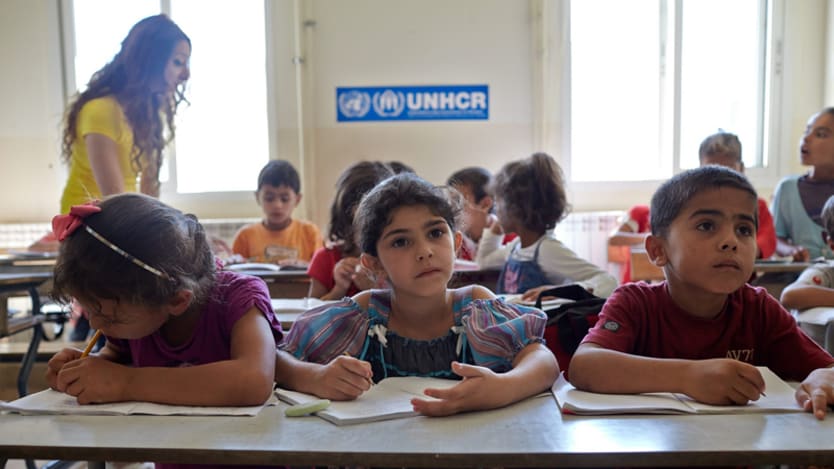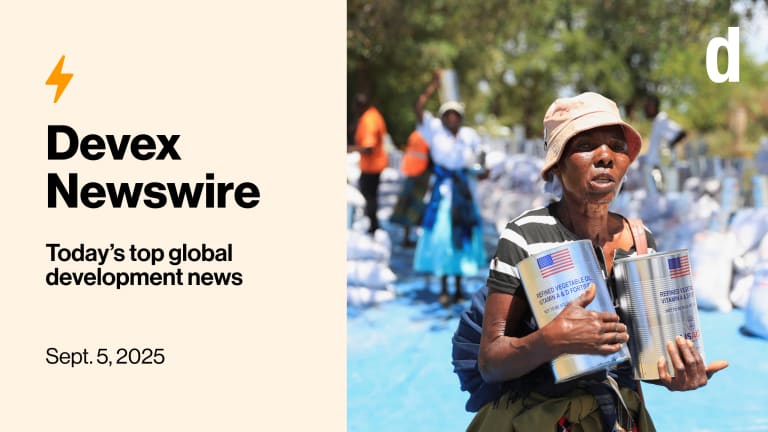Assignment for a better tomorrow: Educate children trapped in conflict and crisis

As the war continues to rage in Syria and images of a devastated Nepal begin to fade from our memories, one human cost often overlooked is the generation of children growing up without an education.
Hundreds of thousands of Syrian children are either living in camps with no schools or have seen their classrooms destroyed or closed. The same is true for Nepalese children patiently waiting for the earthquake damage to be repaired.
Which is why this week’s Oslo Summit on Education for Development’s focus on education in emergencies and protracted crises is so timely.
It coincides with the launch of the final report on the Millennium Development Goals — eight time-bound goals set by world leaders in 2000 — which have galvanized political resolve and contributed to lifting more than 1 billion people out of extreme poverty.
Unfortunately, it also clearly shows that “fragile” countries such as Syria and Nepal typically have the highest poverty rates and are among the hardest to make progress in — including providing children with their most basic right to education.
According to UNICEF, only 30 of 51 fragile countries have met one or more of the MDG targets, which seek to lift people out of poverty by getting children into school, improving health and reducing inequalities, and an additional nine are on track do so.
Critically, more than half of the 57 million young children still not in classrooms today live in countries torn apart by conflict or natural disaster. In countries affected by conflict, the proportion of out-of-school children increased from 30 percent in 1999 to 36 percent in 2012 — and those figures do not even include the Syrian crisis, where enrollment rates for children aged between 6 and 18 years fell 34 percent in 2013 alone.
The sheer tragedy of these figures remind me every day of the children I meet in fragile situations around the world who, when I ask them what they want in life, do not talk about material things, but about education.
They want to go to school, to learn and to become teachers, doctors and scientists. They want a chance to grow up and make a difference to their communities.
But with only a tiny portion of humanitarian aid budgets (roughly 2 percent) being allocated to education, it is clear that for most this is a faraway dream. Which is why we need to speak out loud and clear for the rights of these children and support this call in Oslo for an educational plan for these countries.
It is difficult to think of any other circumstances where education is more important than in creating the basis for conflict resolution, reconciliation and rebuilding of societies.
It’s essential to get children back into school for so many reasons — youngsters who are not in school are at a higher risk of exploitation, girls are more at risk of child marriage or sex slavery, boys of becoming child soldiers.
The statistics show that the longer a child stays out of education, the less likely he or she is to return, so it is imperative that getting them back into school really does become as important as food and shelter.
An education gives a child a gateway out of poverty and provides a sense of normalcy in an otherwise troubled upbringing. A world with education in it is more stable and prosperous — for us all. Consider the links between education and health. If all women had access to secondary education, an incredible 3 million children’s lives would be saved.
The Millennium Development Goals come to an end this December but their work will be continued and expanded by the sustainable development goals. The huge success stories of the MDGs show us that goal setting and aligning partners around common targets delivers results.
The 17 new goals, which aim to end extreme poverty by 2030, draw heavily on lessons learned from the past 15 years. They are an opportunity to build on progress achieved while stepping up our level of ambition to ensure the most disadvantaged people around the world are prioritized.
These new goals have undergone extensive consultations — 193 countries, many civil society organizations, interest groups, the private sector and more than 7 million people have lent their views to this U.N.-led process.
To achieve the SDG goal on education, which will continue the fight to get children into primary school while prioritizing access to secondary education and learning outcomes, the challenges for fragile countries are immense.
For example, Nepal lost 95 percent of its schools in the most recent earthquakes, millions of children in Africa were kept from their classrooms by the Ebola crisis, and the Philippines suffered about $150 million of storm damage to its schools in the past three years.
There has to be additional financing — recent estimates suggest just $74 per child per year in a fragile country — to close the funding gap for preprimary, primary and lower-secondary education.
Clearly, governments caught up in these terrible situations are already stretched to capacity. They need a coordinated global response to provide more robust financial and administrative support if they are to go beyond the everyday struggles of survival and provide a functioning education system too.
This week’s discussions in Oslo are a key opportunity to put the emphasis on prioritizing education for the estimated 65 million innocent children aged 3-15 living in dire circumstances and underline the need for proper financing.
If we are serious about leaving no child behind in the future development agenda, we must acknowledge these challenges immediately and put realistic, well-financed guidelines in place.
We must make sure that, 15 years from now, these children will have enjoyed their right to education, undoubtedly the key to all opportunities life has to offer. This is an indispensable milestone on the road map to homegrown sustainable development.
Join the Devex community and access more in-depth analysis, breaking news and business advice — and a host of other services — on international development, humanitarian aid and global health.
Search for articles
Most Read
- 1
- 2
- 3
- 4
- 5








